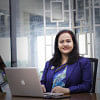What Is Your Name?
The very last words my mother had said to me constituted the question, "What is your name?" We were in the V.I.P. lounge of Dhaka airport and she had just been wheeled in from an aircraft with one of my sisters. Another sister and I had gathered there to receive her, knowing as well as perhaps she did that she was close to dying. And yet she had managed a smile as she said to me, "What is your name?"
The words, indeed, amounted to a kind of game she would play with me whenever I would meet her at my sister's house in Dhaka. It was what we call a rhetorical question since she most certainly did not have to be told what my name was. It was her way of reminding me that while I might be professor of English at the University of Dhaka, I - Dr. Alam, as she would also sometimes teasingly call me - should never forget that I had learned English from her, sometimes, literally at her feet as she did housework, and on other occasions, when she had done the day's work, at the table where all of us siblings would gather to study once we were old enough to do so.
On this International Women's Day, I would like to pay a tribute to my mother, her fierce belief in the importance of education, especially women's education, and the rights of women to study and work and have parity in every sphere with men.
My mother was an outstanding student. Recorded as well as oral family narratives enable me to reconstruct her brilliant performance as a student as well as her aborted student life and its consequences. From one of my aunts' contribution to the 100th anniversary commemorative volume of the Feni Government Girls School I am reminded that both in Class Four and Six she had made it to the All Bengal Merit List and had been awarded scholarships for her achievement. From an uncle's autobiographical novel, I have an explanation of why she had to stop studying when she was in Class Eight. The only Muslim girl studying in a very conservative town, she had become an obvious target of their religious concern. "Why must a Muslim girl study after a point?" they would say. My mother would go to school properly veiled, but these men reminded my grandfather, who had once been a progressive swadeshi but was then embracing a very conservative Islamic position, that there were Hindu male teachers teaching in the school. And, they noted, educated women tended to be immoral. For good measure they added, "Is your daughter going to become a judge/barrister after studying?" What was the point of female education, after all?
Persuaded, my grandfather withdrew my mother from school. The clinching point for him, I learnt from my uncle's narrative, was his own father telling him with finality, "Your daughter has to stop studying. It's enough that she can write letters and read them!" My grandfather tried to placate her by saying that she could sit for the matriculation examination as a "private" student.
Both my aunt's account and my uncle's novel record my mother's intense grief afterwards. For a while, she tried to concentrate on studying for "private" matriculation. But then the First World War broke out; everything was disrupted in Feni, and she was married off after a couple of years. Not only was she grief-stricken at that time, as my aunt notes in her piece, she would carry her grief at being cheated out of an education almost to her grave.
However, my mother was nothing if not a fighter. My uncles would tease her and call her a "communist", and if the word had been fashionable in the late 50s and 60s when they would always be visiting us in our Dhaka house, surely they would have also called her a "feminist", although I am sure she would have detested the sanctimonious and self-serving ways in which the word is at times bandied.
What my mother missed in formal schooling, she made up by reading voraciously, whenever she could spare time to do so. A lasting memory I have of my mother, both after lunch and dinner, and after all the housework was done and our studies supervised, was of her going to bed, day after day and night after night, with the Bangla newspaper, the current issue of the weekly Begum, and some Bangla novel, usually by Sarat Chandra or some other best-selling Bengali author.
Always feisty, and despite being immensely religious and completely devoted to God and the Prophet, she would never miss the opportunity to berate 'holier than thou' Muslim priests and men for the way they treated women. Because she knew the religion well, she would always cite examples of how the place of women was not what it was made to be by patriarchal Muslim men of her generation and how veiling beyond a point was totally unnecessary and the ghomta and orna was good enough, if one knew what was prescribed in the holiest of books and what was not.
But the most eloquent way that my mother protested against the deprivation she and her generation of Muslim women suffered because of their fathers and their friends and mullahs at large, was in her single-minded dedication to the cause of women's education. Not only did she teach us and my four sisters the English and Bangla alphabet, she ensured that her four daughters as well as her one son had equal access to education. She insisted that her daughters earned the highest degree possible in the field of their choice and was proud when they became working women. She was saddened when a couple of them did not go beyond an M. A. degree and when one of them gave up her job. And she did everything for them as long as she could to ensure that they could combine not only higher studies but career goals that would make them what they wanted to be. When I told my wife I would be writing a tribute to my mother for International Women's Dat, she reminded me that my mother had told her when we were leaving for Canada, where I would be doing higher studies, that she should not come back without earning a higher degree in some field or the other.
Moreover, my mother's preoccupation with women's education went beyond her family. She would help any woman wanting to advance herself, through education and through jobs. Whether it was her sisters or her relatives, or even their friends, she offered our house as a home for them and would become their "local guardian" or counsellor, if not a surrogate mother. She also went way out of her way to help any woman she felt was remotely in distress, or lonely, or deprived in any way, with whatever little she could to help or comfort them. And she would teach anyone, male or female, she could get hold of, believing that education was above all!
There is a lot more that I could say about my mother but my 10 minutes are up and so I must end here by saying that I took this occasion not really to give you the feeling that my mother largely made me what I am, but mostly to convey to you how she had pledged herself to parity and worked for the emancipation of women in her own way all her life. In that respect, and in so many ways, she was an exemplary woman and truly ahead of her time and thus worth remembering on this day.
The writer is Professor of English, University of Dhaka.

 For all latest news, follow The Daily Star's Google News channel.
For all latest news, follow The Daily Star's Google News channel. 








Comments